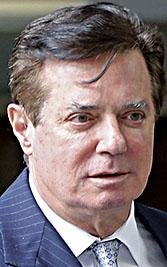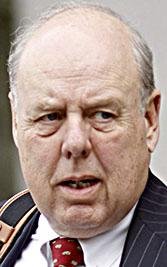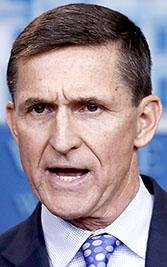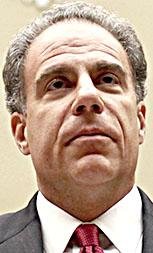WASHINGTON -- A top campaign official for Donald Trump had repeated communications during the final weeks of the 2016 presidential race with a business associate tied to Russian intelligence, according to a document released by the special counsel investigating Russian interference in the election.
The campaign official, Rick Gates, had frequent phone calls in September and October 2016 with a person the FBI believes had active links to Russian spy services at the time, the document released Tuesday said. Gates also told an associate that the person "was a former Russian Intelligence Officer with the GRU," the Russian military intelligence agency, according to the document.
Special counsel Robert Mueller is investigating numerous contacts between Trump's advisers and Russia-linked individuals and entities leading up to and after the November 2016 election. The document, filed in Mueller's name, stated that the communications between Gates and the individual were "pertinent to the investigation."
The individual is identified only as "Person A," and the document describes him as someone who worked for Gates and Paul Manafort, Trump's former campaign chairman, as part of their earlier representation of Russia-aligned parties and politicians in Ukraine, including the former president of Ukraine. A person with knowledge of the matter identified Person A as Konstantin Kilimnik, who for years was Manafort's right-hand man in Ukraine.
Manafort has told associates that he does not believe that Kilimnik has ties to Russian intelligence, but the document released Tuesday shows that Gates told others of Kilimnik's history in the intelligence services. That history was widely discussed for years among people who worked with Manafort and Gates in Ukraine.
Mueller's prosecutors have introduced evidence that Manafort emailed Kilimnik as recently as Nov. 29, about changes to an editorial that ran in an English-language Ukrainian newspaper about his case.
At the time of the calls, Gates was the Trump campaign's liaison to the Republican National Committee, and before that he was the campaign's deputy chairman. Manafort served as the campaign chairman until August 2016, when he resigned amid the growing scrutiny about his work in Ukraine.
Both Manafort and Gates were indicted last year, accused of money laundering and other financial crimes committed while, the charges said, they tried to hide the money they received for their Ukraine work. Last month, Gates pleaded guilty to financial fraud and lying to investigators and has agreed to cooperate with Mueller's investigation.
Manafort has vowed to fight the charges. In February 2017, he told The New York Times that he had "never knowingly spoken to Russian intelligence officers, and I have never been involved with anything to do with the Russian government of the Putin administration or any other issues under investigation today."
But, he added, "It's not like these people wear badges that say, 'I'm a Russian intelligence officer.'"
Kilimnik was born in Ukraine when it was still part of the Soviet Union, and he served in the Russian army as a linguist. Last year, as scrutiny mounted of his work with Manafort and Gates in Ukraine, he steadfastly denied any association with Russian intelligence. An investigation by Ukrainian prosecutors into Kilimnik's possible links to Russian spy agencies was closed late last year without charges filed.
Kilimnik has maintained residences in Moscow and Kiev, the capital of Ukraine, and has traveled regularly between them during years of working for Manafort and Gates on behalf of various Russia-aligned oligarchs and political parties.
SENTENCING MEMORANDUM
The new document is a sentencing memorandum for Alex van der Zwaan, a lawyer who pleaded guilty in February to lying to federal investigators about his conversations with Gates in 2016 about work the two men did in Ukraine.
Van der Zwaan, a Dutch citizen, was an attorney at a firm that worked with Manafort and Gates to prepare a report used to defend Viktor Yanukovych, the former Ukrainian president, from international criticism over the prosecution and incarceration of one of his political rivals.
Van der Zwaan "worked closely" on the report with Gates and Person A, according to a court filing submitted Tuesday night by van der Zwaan's lawyers asking the judge for leniency in sentencing.
Van der Zwaan originally told Mueller's investigators that he had not spoken to Gates since August 2016, but he admitted he had lied after prosecutors confronted him with evidence of conversations.
The sentencing document describes an observation by one unidentified witness in the investigation who said van der Zwaan had "gone native."
"That is, he had grown too close to Manafort, Gates, and Person A," the document stated.
According to the filing by his lawyers, van der Zwaan "had explored opportunities to leave Skadden to work directly for Gates and Manafort" in 2012 and 2013, a reference to the law firm Skadden, Arps, Slate, Meagher & Flom.
Separately, The Washington Post reported Wednesday that Trump's lawyer told attorneys representing Manafort last summer that the president might be willing to pardon him if he was charged with a crime stemming from the Russia investigation.
John Dowd, then Trump's lead lawyer, was described as floating the idea of a pardon for Manafort during the time he was under investigation by Mueller but had not yet been charged, two people familiar with the discussions told the Post. Dowd, who resigned as Trump's lawyer last week, also floated the offer of a pardon last summer to attorneys for former national security adviser Michael Flynn, according to a report Wednesday by The New York Times.
Flynn pleaded guilty to lying to investigators and agreed in December to cooperate with the Mueller probe.
Dowd insisted Wednesday that he did not raise the idea of pardons with lawyers representing the two men.
"I had no such discussions with them," Dowd said in a phone interview. "We never talked about pardons. There was no reason to talk about pardons. No, ma'am."
A spokesman for Manafort, Jason Maloni, declined to comment. Robert Kelner, an attorney for Flynn, also declined to comment.
Legal experts said prosecutors could view the dangle of a presidential pardon to people under investigation as a criminal effort to obstruct justice. Raising such a possibility could be viewed as an incentive for witnesses not to cooperate with investigators.
What precisely Dowd offered -- and whether Trump was involved -- could become part of Mueller's investigation, which has included examining whether the president has taken steps to obstruct or stop the probe.
FBI SCRUTINY
In Washington, meanwhile, the Justice Department's internal watchdog said Wednesday that it will examine Republican complaints of FBI misconduct in the early stages of the Russia investigation.
Inspector General Michael Horowitz's investigation comes at the request of Attorney General Jeff Sessions and congressional Republicans.
They have been urging his office to review whether FBI and Justice Department officials abused their surveillance powers in using information compiled by a former British spy and paid for by Democrats as part of the basis to justify monitoring Carter Page, a former campaign adviser to Trump.
Horowitz said his office will look at those claims, as well as communications among the spy, Christopher Steele, and Justice Department and FBI officials.
Republicans have been fuming about what they see as bias within the FBI, while Democrats say the surveillance abuse allegations are designed to undermine Mueller's sprawling investigation.
Horowitz's review comes weeks after Republicans on the House Intelligence Committee released a declassified memo that detailed the use of political opposition research to obtain a warrant to monitor Page. The GOP memo describes the department's use of information compiled by Steele in obtaining a secret warrant to monitor Page's communications. Steele's anti-Trump research was paid for by Democrat Hillary Clinton's campaign and the Democratic National Committee.
As the Republicans suggested the FBI may have conspired against Trump, Democrats countered with their own memo that said the FBI only "made narrow use" of that research.
Sessions referred the Republican complaints to the inspector general's office, a move that angered Trump, who denounced it as "disgraceful" and said Sessions should have ordered his own investigation. Sessions insisted that he had taken the appropriate step.
The new investigation comes as the FBI is already under intense political pressure. Horowitz's office has been examining for more than a year the FBI's handling of the Clinton email investigation, an inquiry focused not only on specific decisions made by FBI leadership but also on news media leaks. That investigation formed the basis for the firing of former Deputy Director Andrew McCabe. That inspector general's report has not been released, but it is expected out soon.
Some Republicans praised Horowitz's latest move, including Senate Judiciary Chairman Charles Grassley, R-Iowa, who has criticized the process for obtaining secret surveillance warrants and had sought an inspector general review.
"Federal surveillance authority is an important tool to combat terrorism and keep Americans safe, but it must be used by the book in order to protect the constitutional rights and civil liberties of all Americans," he said Wednesday.
Democrats have said the investigations are a waste of money and time.
"It is a shame that the inspector general has to devote resources to investigate a conspiracy theory as fact-free, openly political, and thoroughly debunked as the president's so-called 'FISA abuse,'" said Rep. Jerrold Nadler of New York, the top Democrat on the House Judiciary Committee.
He said the review would show the FBI acted appropriately.
Information for this article was contributed by Mark Mazzetti of The New York Times; by Sadie Gurman and Mary Clare Jalonick of The Associated Press; by David Voreacos of Bloomberg News; and by Carol D. Leonnig, Josh Dawsey and Rosalind S. Helderman of The Washington Post.
A Section on 03/29/2018





